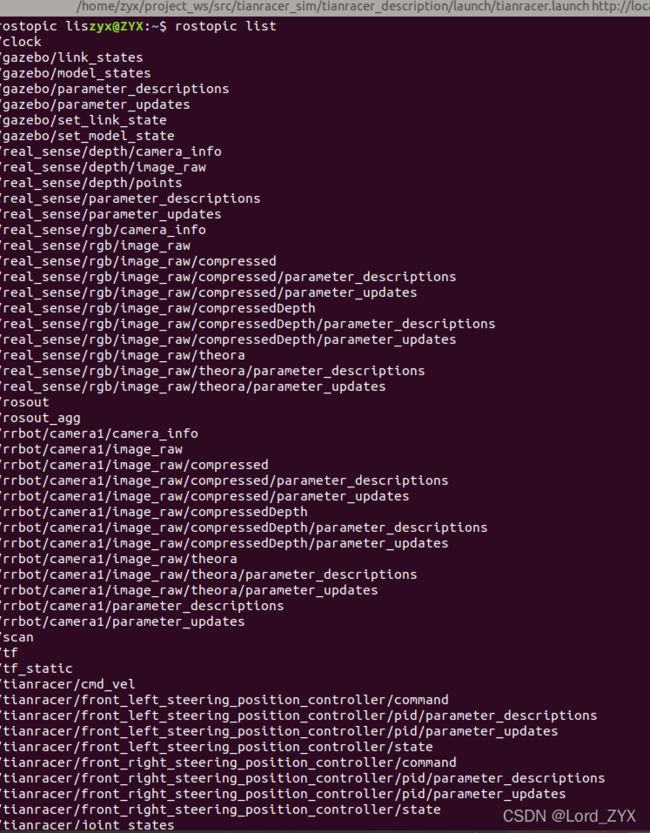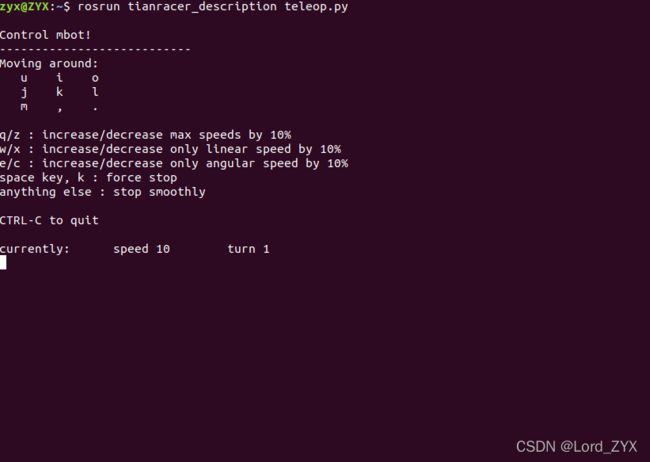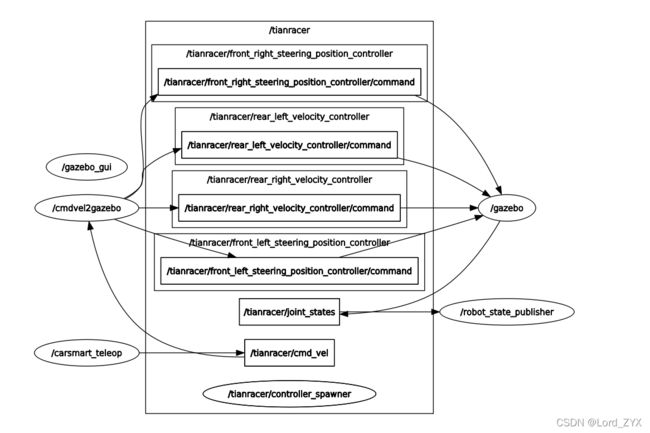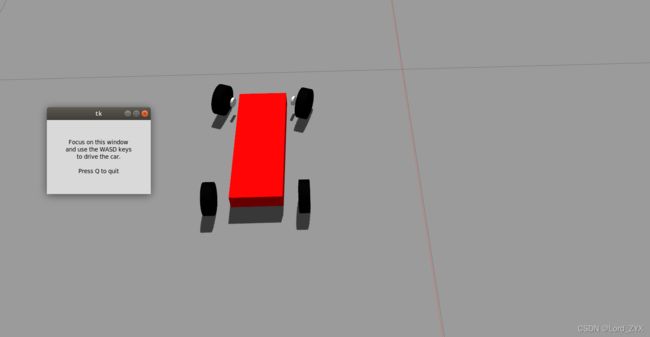阿克曼结构移动机器人的gazebo仿真(三)
阿克曼结构移动机器人的gazebo仿真(三)
第三章、让小车动起来
1.配置controller
在tianracer_description功能包新建config文件夹,通过一个yaml文件smart_control_config.yaml来声明我们所需要的controller,以及对应的参数,PID增益和 控制器设置必须保存在yaml文件中,然后通过 launch文件加载到param服务器上:
tianracer:
# controls the rear two tires based on individual motors
# Publish all joint states -----------------------------------
joint_state_controller:
type: joint_state_controller/JointStateController
publish_rate: 50
rear_right_velocity_controller:
type: velocity_controllers/JointVelocityController
joint: right_rear_wheel_joint
pid: {p: 100.0, i: 0.01, d: 10.0}
rear_left_velocity_controller:
type: velocity_controllers/JointVelocityController
joint: left_rear_wheel_joint
pid: {p: 100.0, i: 0.01, d: 10.0}
front_right_steering_position_controller:
type: effort_controllers/JointPositionController
joint: right_steering_hinge_joint
pid: {p: 4.0, i: 2.0, d: 1.0}
front_left_steering_position_controller:
type: effort_controllers/JointPositionController
joint: left_steering_hinge_joint
pid: {p: 4.0, i: 2.0, d: 1.0}
gazebo_ros_control:
pid_gains:
right_rear_wheel_joint:
p: 100.0
i: 0.5
d: 0.0
left_rear_wheel_joint:
p: 100.0
i: 0.5
d: 0.0
2.配置launch文件
创建一个 rosLaunch 文件以启动 ros_control controllers,使用launch文件control.launch,运行controller_manager中的spawner,加载并运行这些上边这些controller:
接着创建一个可以将小车模型在gazebo中打开的launch文件tianracer.launch,并且能够加载上述control.launch文件
3.配置运动学模型
在功能包中新建scripts文件夹,并加入cmdvel2gazebo.py文件,该文件用的是
从零开始自动驾驶07
中的开源代码,其中代码的解析这里不做展开复述,各位请自行到原地址观看,up主讲的很好。该文件定义了小车的运动学模型,并且订阅了一个Twist消息类型的话题tianracer/cmd_vel,我们可以通过编写一个接收该消息类型话题的节点来控制小车运动。
代码如下:
#!/usr/bin/env python
import rospy
from std_msgs.msg import Float64
from geometry_msgs.msg import Twist
import math
class CmdVel2Gazebo:
def __init__(self):
rospy.init_node('cmdvel2gazebo', anonymous=True)
rospy.Subscriber('/tianracer/cmd_vel', Twist, self.callback, queue_size=1)
self.pub_steerL = rospy.Publisher('/tianracer/front_left_steering_position_controller/command', Float64, queue_size=1)
self.pub_steerR = rospy.Publisher('/tianracer/front_right_steering_position_controller/command', Float64, queue_size=1)
self.pub_rearL = rospy.Publisher('/tianracer/rear_left_velocity_controller/command', Float64, queue_size=1)
self.pub_rearR = rospy.Publisher('/tianracer/rear_right_velocity_controller/command', Float64, queue_size=1)
# initial velocity and tire angle are 0
self.x = 0
self.z = 0
# car Wheelbase (in m)
self.L = 0.261
# car Tread
self.T_front = 0.1632
self.T_rear = 0.1632
# how many seconds delay for the dead man's switch
self.timeout=rospy.Duration.from_sec(0.2);
self.lastMsg=rospy.Time.now()
# maximum steer angle of the "inside" tire
self.maxsteerInside=0.6;
# turning radius for maximum steer angle just with the inside tire
# tan(maxsteerInside) = wheelbase/radius --> solve for max radius at this angle
rMax = self.L/math.tan(self.maxsteerInside);
# radius of inside tire is rMax, so radius of the ideal middle tire (rIdeal) is rMax+treadwidth/2
rIdeal = rMax+(self.T_front/2.0)
# maximum steering angle for ideal middle tire
# tan(angle) = wheelbase/radius
self.maxsteer=math.atan2(self.L,rIdeal)
# loop
rate = rospy.Rate(10) # run at 10Hz
while not rospy.is_shutdown():
self.publish()
rate.sleep()
def callback(self,data):
# w = v / r
self.x = data.linear.x / 0.3
# constrain the ideal steering angle such that the ackermann steering is maxed out
self.z = max(-self.maxsteer,min(self.maxsteer,data.angular.z))
self.lastMsg = rospy.Time.now()
def publish(self):
# now that these values are published, we
# reset the velocity, so that if we don't hear new
# ones for the next timestep that we time out; note
# that the tire angle will not change
# NOTE: we only set self.x to be 0 after 200ms of timeout
delta_last_msg_time = rospy.Time.now() - self.lastMsg
msgs_too_old = delta_last_msg_time > self.timeout
if msgs_too_old:
self.x = 0
msgRear = Float64()
msgRear.data = self.x
self.pub_rearL.publish(msgRear)
self.pub_rearR.publish(msgRear)
msgSteer = Float64()
msgSteer.data = 0
self.pub_steerL.publish(msgSteer)
self.pub_steerR.publish(msgSteer)
return
# The self.z is the delta angle in radians of the imaginary front wheel of ackerman model.
if self.z != 0:
T_rear = self.T_rear
T_front = self.T_front
L=self.L
# self.v is the linear *velocity*
r = L/math.fabs(math.tan(self.z))
rL_rear = r-(math.copysign(1,self.z)*(T_rear/2.0))
rR_rear = r+(math.copysign(1,self.z)*(T_rear/2.0))
rL_front = r-(math.copysign(1,self.z)*(T_front/2.0))
rR_front = r+(math.copysign(1,self.z)*(T_front/2.0))
msgRearR = Float64()
# the right tire will go a little faster when we turn left (positive angle)
# amount is proportional to the radius of the outside/ideal
msgRearR.data = self.x*rR_rear/r;
msgRearL = Float64()
# the left tire will go a little slower when we turn left (positive angle)
# amount is proportional to the radius of the inside/ideal
msgRearL.data = self.x*rL_rear/r;
self.pub_rearL.publish(msgRearL)
self.pub_rearR.publish(msgRearR)
msgSteerL = Float64()
msgSteerR = Float64()
# the left tire's angle is solved directly from geometry
msgSteerL.data = math.atan2(L,rL_front)*math.copysign(1,self.z)
self.pub_steerL.publish(msgSteerL)
# the right tire's angle is solved directly from geometry
msgSteerR.data = math.atan2(L,rR_front)*math.copysign(1,self.z)
self.pub_steerR.publish(msgSteerR)
else:
# if we aren't turning
msgRear = Float64()
msgRear.data = self.x;
self.pub_rearL.publish(msgRear)
# msgRear.data = 0;
self.pub_rearR.publish(msgRear)
msgSteer = Float64()
msgSteer.data = self.z
self.pub_steerL.publish(msgSteer)
self.pub_steerR.publish(msgSteer)
if __name__ == '__main__':
try:
CmdVel2Gazebo()
except rospy.ROSInterruptException:
pass
将代码中的话题名以及参数进行修改,改为自己小车模型的尺寸参数。并将该python代码作为一个节点添加到control.launch文件中。
4.让小车动起来
通过rostopic pub话题让小车动起来
到此为止已经可以通过pub话题让小车动起来了。
roslaunch tianracer_description tianracer.launch
再开一个终端,使用rostopic list来看一下话题列表
rostopic list
可以看到发布了单目摄像头,深度摄像头,激光雷达,以及让小车运动的tianracer/cmd_vel话题,将这个话题pub一下:
rostopic pub /tianracer/cmd_vel -r 10 geometry_msgs/Twist "linear:
x: 1.0
y: 0.0
z: 0.0
angular:
x: 0.0
y: 0.0
z: 1.0"
此时小车便会绕着Z轴转动起来。
使用键盘控制节点控制小车运动
在tianracer_description/scripts目录下新建teleop.py
#!/usr/bin/env python
# -*- coding: utf-8 -*-
import rospy
from geometry_msgs.msg import Twist
import sys, select, termios, tty
msg = """
Control mbot!
---------------------------
Moving around:
u i o
j k l
m , .
q/z : increase/decrease max speeds by 10%
w/x : increase/decrease only linear speed by 10%
e/c : increase/decrease only angular speed by 10%
space key, k : force stop
anything else : stop smoothly
CTRL-C to quit
"""
moveBindings = {
'i':(1,0),
'o':(1,-1),
'j':(0,1),
'l':(0,-1),
'u':(1,1),
',':(-1,0),
'.':(-1,1),
'm':(-1,-1),
}
speedBindings={
'q':(1.1,1.1),
'z':(.9,.9),
'w':(1.1,1),
'x':(.9,1),
'e':(1,1.1),
'c':(1,.9),
}
def getKey():
tty.setraw(sys.stdin.fileno())
rlist, _, _ = select.select([sys.stdin], [], [], 0.1)
if rlist:
key = sys.stdin.read(1)
else:
key = ''
termios.tcsetattr(sys.stdin, termios.TCSADRAIN, settings)
return key
speed = 10
turn = 1
def vels(speed,turn):
return "currently:\tspeed %s\tturn %s " % (speed,turn)
if __name__=="__main__":
settings = termios.tcgetattr(sys.stdin)
rospy.init_node('carsmart_teleop')
pub = rospy.Publisher('/tianracer/cmd_vel', Twist, queue_size=5)
x = 0
th = 0
status = 0
count = 0
acc = 0.1
target_speed = 0
target_turn = 0
control_speed = 0
control_turn = 0
try:
print msg
print vels(speed,turn)
while(1):
key = getKey()
# 运动控制方向键(1:正方向,-1负方向)
if key in moveBindings.keys():
x = moveBindings[key][0]
th = moveBindings[key][1]
count = 0
# 速度修改键
elif key in speedBindings.keys():
speed = speed * speedBindings[key][0] # 线速度增加0.1倍
turn = turn * speedBindings[key][1] # 角速度增加0.1倍
count = 0
print vels(speed,turn)
if (status == 14):
print msg
status = (status + 1) % 15
# 停止键
elif key == ' ' or key == 'k' :
x = 0
th = 0
control_speed = 0
control_turn = 0
else:
count = count + 1
if count > 4:
x = 0
th = 0
if (key == '\x03'):
break
# 目标速度=速度值*方向值
target_speed = speed * x
target_turn = turn * th
# 速度限位,防止速度增减过快
if target_speed > control_speed:
control_speed = min( target_speed, control_speed + 0.02 )
elif target_speed < control_speed:
control_speed = max( target_speed, control_speed - 0.02 )
else:
control_speed = target_speed
if target_turn > control_turn:
control_turn = min( target_turn, control_turn + 0.1 )
elif target_turn < control_turn:
control_turn = max( target_turn, control_turn - 0.1 )
else:
control_turn = target_turn
# 创建并发布twist消息
twist = Twist()
twist.linear.x = control_speed;
twist.linear.y = 0;
twist.linear.z = 0
twist.angular.x = 0;
twist.angular.y = 0;
twist.angular.z = control_turn
pub.publish(twist)
except:
print e
finally:
twist = Twist()
twist.linear.x = 0; twist.linear.y = 0; twist.linear.z = 0
twist.angular.x = 0; twist.angular.y = 0; twist.angular.z = 0
pub.publish(twist)
termios.tcsetattr(sys.stdin, termios.TCSADRAIN, settings)
该节点发布了一个Twist消息类型的话题tianracer/cmd_vel,可以通过键盘来控制小车运动。
roslaunch tianracer_description tianracer.launch
rosrun tianracer_description teleop.py
此时按u,i,o等按键即可控制小车运动了,通过rqt_graph看一下各个节点之间的关系:
rqt_graph
小结
至此,已经成功让小车动起来了,而且也添加了激光雷达传感器,这也就意味着接下去就能做建图导航了,然而由于从solidworks导出的模型惯性参数等方面的一些问题,导致小车运动起来多多少少有一些问题,所以我手撸了小车的1:1简易模型的代码,并且准备用ackermann消息控制小车运动,并使用该模型完成接下去的建图导航等内容。
参考资料
1.古月老师的<
2.从零驾驶自动驾驶



